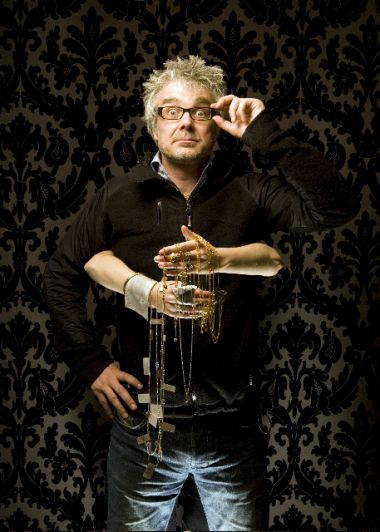All that glitters is not gold: The ugly truth about the jewellery industry

Diamonds, gold and silver are well known for coming at a hefty price for the consumer, but little thought is given to the miners who are forced to work in horrendous conditions in some of the world's poorest countries so we can add a bit of sparkle to our outfit.
The multi-billion pound jewellery industry may seem like just a bit of fun, but it carries a dark secret and an unthinkable cost for millions of vulnerable people across the globe who survive on just $1 to $2 a day.
Figures suggest that there are over 150 million people dependent on the mining industry worldwide for their daily bread, either workers or their families. Fifteen million are employed in Africa alone where they are marginalised and exploited by warlords, traders and large-scale mining companies.
Christian activist Greg Valerio is passionate about transforming these statistics, and has played an integral role in the Fairtrade gold movement in the UK. He believes that the Church can be a key player in encouraging people to be part of the campaign to make ethical and fair jewellery the norm.
Despite attempts to certify diamond, gold and silver production, the process is riddled with holes that mean much of our jewellery is currently sourced from conflict zones, funding corrupt groups and allowing for the severe abuse of human rights.
Greg affirms this in his blog. "Despite the jewellery marketing world's desire to project a world of luxury, innocence, love and purity, the reality could be no further from the truth," he writes.
"With deeply embedded corruptions, armed conflicts, systematic environmental destruction and pollution, human rights abuses, child labour/forced labour, smuggling and entrenched poverty, the jewellery supply chain has much to hide and the marketing narrative is as much about diverting attention away from these ugly truths, as it is beguiling and exploiting the consumer's innocence about the roots of jewellery through appealing to their vanity."
It is for this reason he has spent nearly twenty years campaigning for the jewellery industry to clean up its act, end systemic exploitation, and use Fairtrade gold that is traceable to source.
"There are several headline issues around the jewellery industry," Greg tells us. "The first of which is disingenuous marketing to the consumer and a moral disconnect in the story. Jewellers never disclose the source of their products, so the consumer does not know if what they are buying comes from a responsible source, or if it has links to conflict or child labour. That really is a consumer rights issue.

"Secondly, the jewellery supply chain is riddled with all kinds of malpractice and thirdly, there are huge environmental issues."
Greg explains that a typical gold ring creates approximately 20 tonnes of mining waste.
"The environmental impact of mining is absolutely colossal," he says, noting also that the connecting human rights issues – the land rights of displaced people – are "vast and explosive".
In his work with Fairtrade gold, Greg operates exclusively with small-scale miners – who make up over 80% of those who work in the mining industry globally - and is currently working principally in Peru. Three hundred miners in Sotrami are given fair pay for their work and money is invested in their local community, where there is now better healthcare, schools and even a wholesale food store.
Fairtrade is also working with miners in Bolivia, Columbia and Ecuador, and is piloting nine programmes in Africa, from which they hope to have two more mines Fairtrade certified by the middle of next year.
"For us it's slow, steady, long-term transformation," Greg explains. "It's a long journey, but we keep going."
With 60 license holders now in the UK for Fairtrade marking in gold and silver, including Stephen Webster, Jon Dibbon and Cred Jewellery, he believes that consumers need to be educated as to the impact of their purchases.
"Until they know, they won't change. Awareness is incredibly low," he says.
"The average Fairtrade wedding ring of 4-5g costs, about £12.50 more than a non-Fairtrade ring. There really is no financial reason why consumers and jewellers can't adopt this."
As a Christian, Greg believes that the Church must get behind the campaign and support Fairtrade jewellery.
"Christians have an integral role to play in flipping the UK jewellery market," he asserts.
"The Church is still the venue of choice for weddings, so what we want is church ministers whipping out a leaflet when they meet engaged couples and sharing about Fairtrade gold.
"Our ambition is for Fairtrade gold to be the default for wedding rings. With an estimated 250,000 weddings a year in the UK, we'd like to capture 100,000 rings annually. If we do that, we will hit approximately 500 kilos of Fairtrade gold in the UK market which will create $1million to go back into marginalised and poor communities."
More information about the movement and where to buy Fairtrade jewellery can be found at www.fairtrade.org.uk/gold











